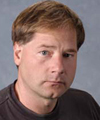Dr. Bart
Kosko
University of
Southern California
Bart Kosko is a professor of electrical engineering at USC. He holds degrees in philosophy, economics, mathematics, electrical engineering, and law—and is a licensed California attorney. Dr. Kosko is the author of Noise, Fuzzy Thinking, Heaven in a Chip, the novel Nanotime, and several textbooks and edited volumes dealing with fuzzy logic, neural networks, and intelligent signal processing.
Professor Kosko is a regular guest on radio and TV and his writings have appeared in the Los Angeles Times, the New York Times, Scientific American, and many other popular venues. He is an award-winning composer and resides in Los Angeles.
.
|
A recent expert commentator noted that for politicians ‘war is a democracy-free zone’ where people are willing to abandon their rights in the face of fear. In his book Nineteen Eighty-Four George Orwell outlined the elements of the ‘perfect war’: an invisible enemy that could never be completely defeated. Sound familiar? Early in the period following 9/11 statements were being made that ‘the war on terrorism is going to be a very long war’. Why long? The enemy is ‘people who hate freedom’ – lacking any other observable identity or geographical location.
The invasion of Iraq was based on an absence of convincing negative evidence proving that Iraq didn’t have any WMD, combined with reasoning that the ‘invisible enemy’ might acquire Iraq’s WMDs somehow, someday – and use them to attack the United States cities. This was the basis of the United States pre-emptive war and subsequent occupation of Iraq.
(Terrorism Article by Bart Kosko pdf)
This Café is an exploration of reasoning based on negative evidence in the context of real and contrived fear.
Second Related Topic: Despite considerable hyperbole concerning global warming and the great dangers that it poses to humankind and life on the planet, a number of experts have questioned the interpretation of the evidence and the credibility of the computer model projections. Michael Crichton in his book, State of Fear, suggests that the evidence and reasoning concerning global warming is analogous to what Orwell outlines in Nineteen Eighty-four. A recent YouTube presentation by an Oregon teacher reasoned that we should take pre-emptive action on global warming even if the evidence and computer models are unconvincing.
BACKGROUND RESEARCH:
On the War on Terrorism
Selection from Wikipedia on George Orwell’s book Nineteen Eighty-Four. See Section “The War”. Further interest by clicking on ‘perpetual war’.
On Global Warming (Recent Article Questioning)
“A comparison of tropical temperature trends with model predictions”
David H. Douglass, Department of Physics and Astronomy, University of Rochester, Rochester, NY 14627, USA, et al.
(full pdf is available)
“ABSTRACT: We examine tropospheric temperature trends of 67 runs from 22 ‘Climate of the 20th Century’ model simulations and try to reconcile them with the best available updated observations (in the tropics during the satellite era). Model results and observed temperature trends are in disagreement in most of the tropical troposphere, being separated by more than twice the uncertainty of the model mean. In layers near 5 km, the modeled trend is 100 to 300% higher than observed, and, above 8 km, modeled and observed trends have opposite signs. These conclusions contrast strongly with those of recent publications based on essentially the same data.
“Conclusion: The last 25 years constitute a period of more complete and accurate observations and more realistic modeling efforts. Yet the models are seen to disagree with the observations. We suggest, therefore, that projections of future climate based on these models be viewed with much caution.”
INTERNATIONAL JOURNAL OF CLIMATOLOGY
Int. J. Climatol. (December 2007)
Publication of the Royal Society of Meteorology
|
